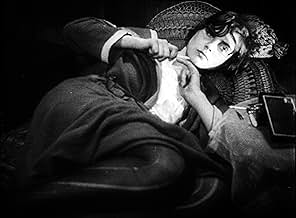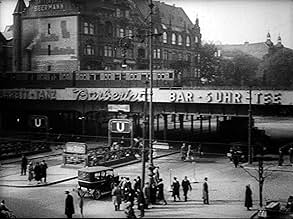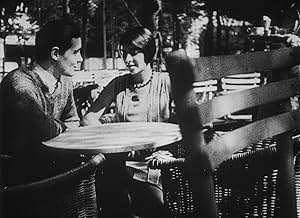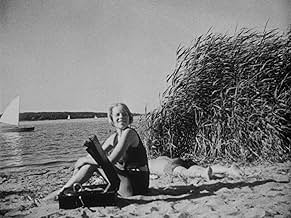IMDb RATING
7.3/10
3.8K
YOUR RATING
Two men and two women enjoy a pleasant Sunday at the beach amid the unending toil of the working week.Two men and two women enjoy a pleasant Sunday at the beach amid the unending toil of the working week.Two men and two women enjoy a pleasant Sunday at the beach amid the unending toil of the working week.
Kurt Gerron
- Self
- (uncredited)
Valeska Gert
- Self
- (uncredited)
Heinrich Gretler
- Self
- (uncredited)
Moriz Seeler
- Photo Subject at Beach
- (uncredited)
Ernö Verebes
- Self
- (uncredited)
Featured reviews
Extraordinary and very simple silent film, put together by some of the most remarkable talents of Twentieth Century Cinema - just read those credits! Within a few years most of these people were in Hollywood, and Hitler had destroyed both the wonderful film industry they had helped build and the joyous Berlin that this film depicts.
The film tells the story of four strangers, two men and two women, enjoying a lazy Sunday by a lake in Berlin. Nothing much seems to happen, but there is a lot going on, as the four interact. There is innocence, the potential for love, the danger of sex, the force of jealousy and the pain of longing. And through it all is the joy of living!
Magnificently shot - largely in extreme close-up - the film allows us a glimpse of Berlin between the wars and it is sad to watch it with the knowledge of what was soon to be. It would have been impossible to make this film with dialogue - the words would have destroyed the nuance and the emotion. It reveals the power of silent cinema.
If the print you see is without a soundtrack, as mine was, then may I recommend playing the Essential Marlene Dietrich during the film. I did this and the combination was unforgettable.
The film tells the story of four strangers, two men and two women, enjoying a lazy Sunday by a lake in Berlin. Nothing much seems to happen, but there is a lot going on, as the four interact. There is innocence, the potential for love, the danger of sex, the force of jealousy and the pain of longing. And through it all is the joy of living!
Magnificently shot - largely in extreme close-up - the film allows us a glimpse of Berlin between the wars and it is sad to watch it with the knowledge of what was soon to be. It would have been impossible to make this film with dialogue - the words would have destroyed the nuance and the emotion. It reveals the power of silent cinema.
If the print you see is without a soundtrack, as mine was, then may I recommend playing the Essential Marlene Dietrich during the film. I did this and the combination was unforgettable.
Marvellous late German silent that anticipates the Italian neo-realists, although I note some claim that this is not realistic at all and may even be showing struggling Berlin through rose tinted glasses. I'm not sure; those fantastic city sequences seem real enough and perhaps the regularly intoned opinion that Hitler was lurking in the shadows of a dispirited people, is itself a little fanciful. In any event this is a great little film filled with fantastic shots, moving street shots of and from moving trams, poetic close-ups of the young folk and a great sense of landscape at the lakeside. As usual with me and silent movies, I seem to get captions I don't need because the action is so obvious and whole sequences of back and forth dialogue left untitled. But just to watch the imagery is good enough and the little trysts, arguments, upsets and loving looks need no titles at all.
If you enjoy classic silent cinema then you won't want to miss this treat. At times scenes are reminiscent of King Vidor's The Crowd, made just the year before (most especially in those moments set indoors, during which one of the couples gently bicker or the scene during which the principals first meet up for their group date); while at others the open air, carefree mood is suggestive of Renoir's masterpiece Partie de Campagne, made a decade later. But People on Sunday is a distinct work in its own right, an evocative film made by some stellar talent: the Siodmak brothers, Edgar Ulmer, Billy Wilder and Fred Zimmerman - all of whom would go on to varying degrees of success in the States after fleeing the Nazis. Their film is thus both a record of a time lost, a beautifully shot piece showing a Berlin that was soon to vanish for ever, as well as demonstrating the collaborative talents of some major figures in their early years. There is no hint of the dark years to come seen here, or the debilitating effects of run away inflation which marked the end of the Weimar Republic and led to the inexorable rise of extreme politics. People on Sunday is above such explicit social comment, unless it is political by the mere fact of focusing on ordinary people. It simply tells the tale of a group (played by non professional actors we are informed, but it hard to tell such is the quality of the performances) enjoying themselves while out on one sunny weekend day, picnicking, boating, kissing, promising more to each other and so on, interspersed with more general shots of the German people similarly at play. The skill and pleasure for the viewer today is in the way this is done, completely without ostentation, shot marvelously, everything still feeling fresh, spontaneous and genuine , and with a real feeling for place. Ironically, for this viewer at least, so much of the film seems so natural and fluid that one is more aware that is an illusion; such unforced art as this takes a great deal of time, patience and skill on the part of the participants and creators.
If you want to see more of German cinema from this period, other than more familiar classics, then this is a real treat, being both less known and marvelously restored. The BFI DVD version has been created from several sources and is the longest version available. It also features a splendid Weill-like score, which fits the milieu like a glove and which begs issuing separately as it stands up well as a listen on its own.
If you want to see more of German cinema from this period, other than more familiar classics, then this is a real treat, being both less known and marvelously restored. The BFI DVD version has been created from several sources and is the longest version available. It also features a splendid Weill-like score, which fits the milieu like a glove and which begs issuing separately as it stands up well as a listen on its own.
A German silent curio heralds several future magnates of the film industry in Hollywood, PEOPLE ON Sunday is the debut feature for both its directors Robert Siodmak and Edgar G. Ulmer, with a script from a tender-age Billy Wilder and Fred Zinnemann in the camera branch. It is a bracing urban symphony of Berlin during the interwar times, confining its time-frame within a weekend, convenes a cast of five non-professional young actors (who are essentially playing themselves) and blithely breaking the boundary of studio lot and taking the story onto the streets of the metropolis, from a rush-hour Behnhof Zoo train station near the beginning to the movie's main course, a Sunday outing in Wannasee.
The quintet are Erwin, a taxi driver, his model wife Annie, and his friend Wolfgang, a wine dealer, then Christl, a film extra Wolfgang accosts in the said train station and Brigitte, her friend, who works in a record shop. Throughout its simple plot structure, the narrative heartily proceeds with a bifurcating stratagem, a plump, honest-looking Erwin's squabble-plagued marital life with a languorous Annie in their pokey bedsit, contrasting with a louche Wolfgang's pat oscillation in wooing either Christl or Brigitte, furthermore, a tangible rift is wondrously evinced between the two flappers, Christl is the prim and proper type, who naturally spurns Wolfgang's advances in the well-orchestrated lake-swimming sequences, but when she notices that Wolfgang takes his offensive towards a more skittish Brigitte and the two become lovey-dovey, she can barely contain her pique, not only to Wolfgang, but also to her girlfriend.
Yet, what leaves the most piquant tang is a thoroughgoing embodiment of machismo by the two male creatures, Erwin is the off-limits married man, both girls give him a decent berth, humbled by a comparatively more good-looking and athletic Wolfgang, he knows his role very well, a sausage juggler for laughter, a cavalier company, completely forgets about Annie's absence when there are new girls around, but also seemingly attests that, when sex is off the table, girls are just girls, no further communication is worth his effort. Wolfgang is more or less more readable, cops a feel whenever he can find a chance but will not get his feet wet into a stable relationship, and if a girl becomes too pushy, there is always a Sunday football match he can attend with his buddy Erwin.
A lilting juvenilia robustly interpolates expressionistic portraiture and vignettes (there are some very impressive close-ups both in still and in motion should be attributed to the young but ingenious film crew) in all the larking and perambulating, PEOPLE ON Sunday can still turn heads not just as a chirpy comedy, but also, a counter-time escapist prose because unfortunately we cannot blot out the fact that something egregiously sinister was incubating in that touchy era and that particular country.
The quintet are Erwin, a taxi driver, his model wife Annie, and his friend Wolfgang, a wine dealer, then Christl, a film extra Wolfgang accosts in the said train station and Brigitte, her friend, who works in a record shop. Throughout its simple plot structure, the narrative heartily proceeds with a bifurcating stratagem, a plump, honest-looking Erwin's squabble-plagued marital life with a languorous Annie in their pokey bedsit, contrasting with a louche Wolfgang's pat oscillation in wooing either Christl or Brigitte, furthermore, a tangible rift is wondrously evinced between the two flappers, Christl is the prim and proper type, who naturally spurns Wolfgang's advances in the well-orchestrated lake-swimming sequences, but when she notices that Wolfgang takes his offensive towards a more skittish Brigitte and the two become lovey-dovey, she can barely contain her pique, not only to Wolfgang, but also to her girlfriend.
Yet, what leaves the most piquant tang is a thoroughgoing embodiment of machismo by the two male creatures, Erwin is the off-limits married man, both girls give him a decent berth, humbled by a comparatively more good-looking and athletic Wolfgang, he knows his role very well, a sausage juggler for laughter, a cavalier company, completely forgets about Annie's absence when there are new girls around, but also seemingly attests that, when sex is off the table, girls are just girls, no further communication is worth his effort. Wolfgang is more or less more readable, cops a feel whenever he can find a chance but will not get his feet wet into a stable relationship, and if a girl becomes too pushy, there is always a Sunday football match he can attend with his buddy Erwin.
A lilting juvenilia robustly interpolates expressionistic portraiture and vignettes (there are some very impressive close-ups both in still and in motion should be attributed to the young but ingenious film crew) in all the larking and perambulating, PEOPLE ON Sunday can still turn heads not just as a chirpy comedy, but also, a counter-time escapist prose because unfortunately we cannot blot out the fact that something egregiously sinister was incubating in that touchy era and that particular country.
Five non-professional actors star in this tale of a typical Sunday idyll in and around Berlin. We meet taxi driver Erwin Splettstober, wine salesman Wolfgang von Waltershausen, music store clerk Brigitte Borchert, film extra Christl Ehlers, and model Annie Schreyer, attractive young people who are looking to relax on a sunny Sunday. The first four travel out to the country for a frolic in and around a lake, during which romantic attachments are formed and lost. This is cut together with documentary footage of average German citizens enjoying their Sunday in various ways.
This hard-to-classify effort has a stellar line-up behind the scenes: Billy Wilder and Curt Siodmak worked on the screenplay, the direction was by Robert Siodmak and Edgar G. Ulmer, and an uncredited Fred Zinnemann worked on various aspects of the movie, as well. The cinematography, although primitive and obvious in its trickery (I'm thinking of the often reflected light creating a sun-dappled effect on the actors' faces), has a modernity and immediacy seldom seen in films of the time. I think my favorite sequence of the film was a montage of close-up faces, of all shapes and sizes, of people around the lake. Recommended.
This hard-to-classify effort has a stellar line-up behind the scenes: Billy Wilder and Curt Siodmak worked on the screenplay, the direction was by Robert Siodmak and Edgar G. Ulmer, and an uncredited Fred Zinnemann worked on various aspects of the movie, as well. The cinematography, although primitive and obvious in its trickery (I'm thinking of the often reflected light creating a sun-dappled effect on the actors' faces), has a modernity and immediacy seldom seen in films of the time. I think my favorite sequence of the film was a montage of close-up faces, of all shapes and sizes, of people around the lake. Recommended.
Did you know
- TriviaThe film was a major hit when it was released in Germany in 1930. Five of the people who worked on the film went on to direct films in Hollywood: Curt Siodmak, his brother Robert Siodmak, Edgar G. Ulmer, Fred Zinnemann, and Billy Wilder.
- GoofsWhen the movie star picture cards are torn off the wall, the number of cards still on the wall constantly changes. Sometimes more cards are still on the wall than in the shot before, etc.
- ConnectionsFeatured in Histoire(s) du cinéma: Toutes les histoires (1988)
- How long is People on Sunday?Powered by Alexa
Details
- Runtime
- 1h 13m(73 min)
- Color
- Sound mix
- Aspect ratio
- 1.20 : 1
Contribute to this page
Suggest an edit or add missing content
















